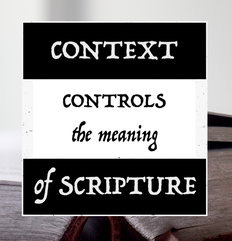| We all have secrets. Some secrets we intentionally hide; others reside deep in our subconscious hiding unaware, pretending to stay out of sight for our good. As I have studied the historical background of the Bible for the last 20 years, I have repeatedly discovered Jesus’ message to be shaped more by our attractions than his intentions. When I have shared what I learned in chapels and classrooms, Bible studies and beer gardens, the response has been mixed. Many would rather retain what they like rather than learn what Jesus meant. |
|
We like to have our truth, rather than be disrupted by the truth. Our aversion to alter what we have assumed reveals a nasty secret in our subconscious. What is that secret?
1 Comment
 These ten books will get you to stop guessing what Bible verses mean and start grasping the original point made by the authors. These books about Bible backgrounds will introduce you to the cultural context that defined the meaning of words, phrases, and entire genres found in Scripture. If you want to discern how the Bible directs us today, you must first understand how it redirected the conversations and communities in ancient near eastern cultures. So read these books. Process them in community. And refer to them as you study Scripture. I now give to you the top 10 Bible study books about the historical and cultural context of Scripture.  The Gospel of Mark hinges on a climactic turning point. After Jesus spends 8 chapters doing miracles that only the Son of God would do, the disciples finally figure out who he is. While other Israelites thought he was a special prophet like Jeremiah or Elijah, Peter proclaimed in Mark 8:29, “You are the Messiah.” That identification changes the trajectory and content of Mark’s Gospel. Everything leading up to Mark 8:29 is designed to reveal who Jesus is, but everything afterwards redefines what the disciples think about the Messiah. Jesus immediately begins to correct their assumptions about what the Messiah will do. “And He began to teach them that the Son of Man must suffer many things and be rejected by the elders and the chief priests and the scribes, and be killed, and after three days rise again” (Mark 8:31). Jesus had to teach them about his torturous destiny over and over again (Mark 9:12, 31-32; 10:33-34). Why? Because the disciples already thought the Messiah would kill all the bad guys, not get killed by them.  How can we avoid mistaking the echo of our own assumptions for the meaning of God's Word? The terrific task handed down to us since the Reformation is to interpret Scripture on our own. Bible translations have proliferated. Bible reading has become the bedrock of Protestant spirituality. Bible interpretation, therefore, is the lynchpin to which Lord you serve. The watershed issue in our imagination of God is the way in which we determine the meaning of the text. So are you hearing God's voice or only pandering to your pre-existing beliefs by making verses verify your personal preferences?  What is the role of the Holy Spirit in personal Bible interpretation? Yep, I'm going there. This question consistently pops up when I teach students how to interpret the Bible. Somewhere between analyzing the literary context and historical context of Bible passages, students wonder if all this work is necessary. Won’t the Spirit just guide me into all truth? I have found that vague notions about the Spirit's role in guiding you toward truth translates into an excuse for undisciplined and inaccurate Bible study. If you feel the Spirit showed you a special meaning in a verse, you go with it. You excuse the need to use hermeneutical skills or check your conclusion in a community of better-trained Bible users. And why not? Isn't it just me + Holy Spirit = all I need to discern the truth?  Would Jesus promote personal Bible reading? You probably never thought to ask yourself that question. Protestant Christians assume getting a Bible into everyone’s hand is a good thing. Christian donors pump hundreds of millions into Bible translation and distribution every year. With that money Biblica, Wycliffe, and The Seed Company crank out translations in new languages. Scripture Union promotes Bible reading plans. Faith Comes By Hearing and YouVersion build out robust apps with audio Bibles. GoTandem even texts daily Bible verses selected for your season in life. I wonder: Is all this cash and energy well spent? History says “no.” |
BUY the BOOKAuthorPaul Penley's training as a Bible scholar, life as a human being, and work as a philanthropic advisor overflows into this blog Top 5 BlogsCategories
All
Archives
January 2021
|







 RSS Feed
RSS Feed
